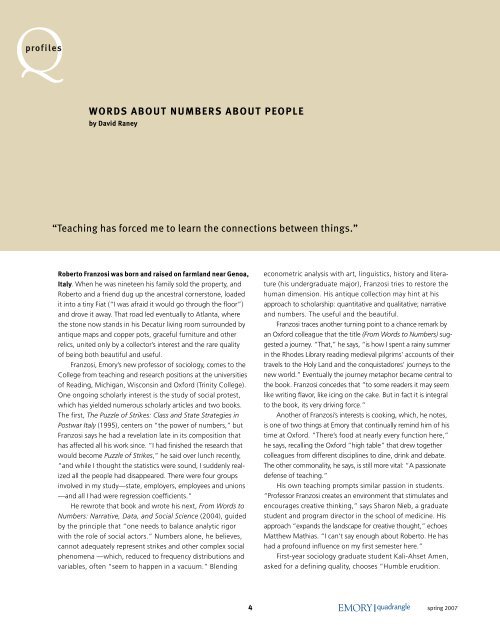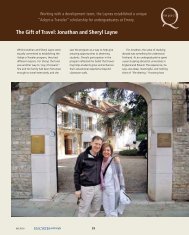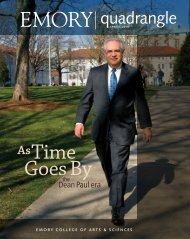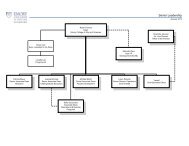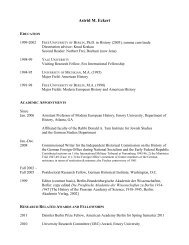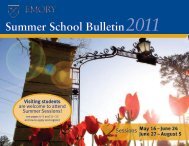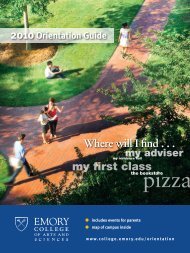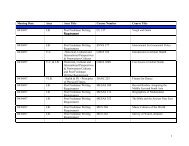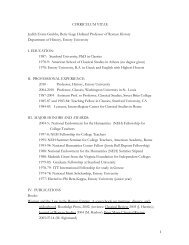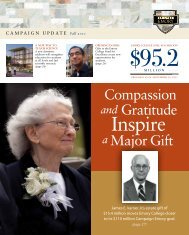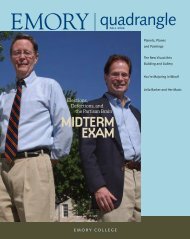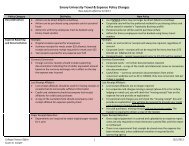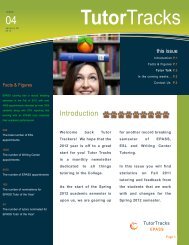quadrangle - Emory College - Emory University
quadrangle - Emory College - Emory University
quadrangle - Emory College - Emory University
You also want an ePaper? Increase the reach of your titles
YUMPU automatically turns print PDFs into web optimized ePapers that Google loves.
table of contents<br />
profiles<br />
Words About Numbers About People<br />
by David Raney<br />
“Teaching has forced me to learn the connections between things.”<br />
Roberto Franzosi was born and raised on farmland near Genoa,<br />
Italy. When he was nineteen his family sold the property, and<br />
Roberto and a friend dug up the ancestral cornerstone, loaded<br />
it into a tiny Fiat (“I was afraid it would go through the floor”)<br />
and drove it away. That road led eventually to Atlanta, where<br />
the stone now stands in his Decatur living room surrounded by<br />
antique maps and copper pots, graceful furniture and other<br />
relics, united only by a collector’s interest and the rare quality<br />
of being both beautiful and useful.<br />
Franzosi, <strong>Emory</strong>’s new professor of sociology, comes to the<br />
<strong>College</strong> from teaching and research positions at the universities<br />
of Reading, Michigan, Wisconsin and Oxford (Trinity <strong>College</strong>).<br />
One ongoing scholarly interest is the study of social protest,<br />
which has yielded numerous scholarly articles and two books.<br />
The first, The Puzzle of Strikes: Class and State Strategies in<br />
Postwar Italy (1995), centers on “the power of numbers,” but<br />
Franzosi says he had a revelation late in its composition that<br />
has affected all his work since. “I had finished the research that<br />
would become Puzzle of Strikes,” he said over lunch recently,<br />
“and while I thought the statistics were sound, I suddenly realized<br />
all the people had disappeared. There were four groups<br />
involved in my study—state, employers, employees and unions<br />
—and all I had were regression coefficients.”<br />
He rewrote that book and wrote his next, From Words to<br />
Numbers: Narrative, Data, and Social Science (2004), guided<br />
by the principle that “one needs to balance analytic rigor<br />
with the role of social actors.” Numbers alone, he believes,<br />
cannot adequately represent strikes and other complex social<br />
phenomena —which, reduced to frequency distributions and<br />
variables, often “seem to happen in a vacuum.” Blending<br />
econometric analysis with art, linguistics, history and literature<br />
(his undergraduate major), Franzosi tries to restore the<br />
human dimension. His antique collection may hint at his<br />
approach to scholarship: quantitative and qualitative; narrative<br />
and numbers. The useful and the beautiful.<br />
Franzosi traces another turning point to a chance remark by<br />
an Oxford colleague that the title (From Words to Numbers) suggested<br />
a journey. “That,” he says, “is how I spent a rainy summer<br />
in the Rhodes Library reading medieval pilgrims’ accounts of their<br />
travels to the Holy Land and the conquistadores’ journeys to the<br />
new world.” Eventually the journey metaphor became central to<br />
the book. Franzosi concedes that “to some readers it may seem<br />
like writing flavor, like icing on the cake. But in fact it is integral<br />
to the book, its very driving force.”<br />
Another of Franzosi’s interests is cooking, which, he notes,<br />
is one of two things at <strong>Emory</strong> that continually remind him of his<br />
time at Oxford. “There’s food at nearly every function here,”<br />
he says, recalling the Oxford “high table” that drew together<br />
colleagues from different disciplines to dine, drink and debate.<br />
The other commonality, he says, is still more vital: “A passionate<br />
defense of teaching.”<br />
His own teaching prompts similar passion in students.<br />
“Professor Franzosi creates an environment that stimulates and<br />
encourages creative thinking,” says Sharon Nieb, a graduate<br />
student and program director in the school of medicine. His<br />
approach “expands the landscape for creative thought,” echoes<br />
Matthew Mathias. “I can’t say enough about Roberto. He has<br />
had a profound influence on my first semester here.”<br />
First-year sociology graduate student Kali-Ahset Amen,<br />
asked for a defining quality, chooses “Humble erudition.<br />
spring 2007


